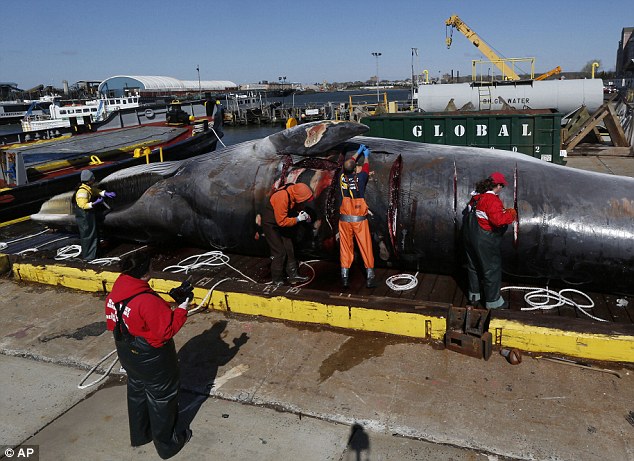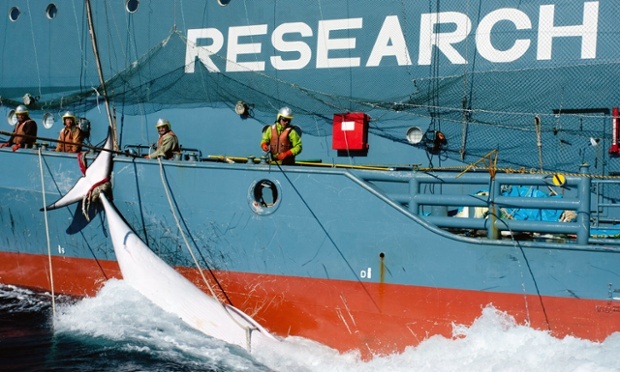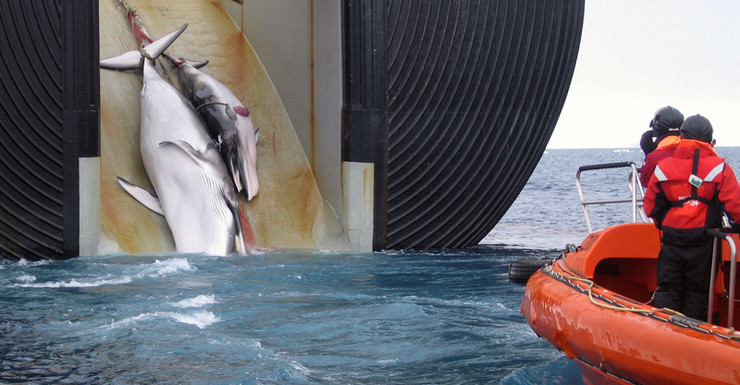Japan Has Killed 14,000 Whales So Far, And No One Can Stop Them From Killing More
Japan has long maintained that most whale species are not endangered and that eating whale is part of its food culture.
According to a recent study, the humans have annihilated just short of 3 million whales over the course of the 20th century. It's "the largest hunt in human history." It's result? Many whale populations had been reduced to small fractions of their pristine abundance!
While whale populations have begun to recover across the globe, they still need to be protected against human predation, in particular against Japan. It has killed 14,000 whales since the worldwide ban on commercial whaling issued in 1986. It further plans to kill 4,000 whales in the Antarctic over the next 12 years.
But why should you care? Because it's a unique creature!
Whales are extremely intelligent creatures, so much so that biologist Hal Whitehead believes they have their own equivalent of culture. Whitehead told the Guardian in 2011 that he was "studying a group of whales off the Galápagos Islands, looking at their social systems, and found two kinds of sperm whale who were behaving really quite differently ... there was virtually no difference genetically ... It became obvious that the only explanation was that these whales had different cultures. They were living in a multicultural society. The culture and brain of the whale is a vast mystery and something really hard to get at scientifically." The mass destruction of whales is thus an ethical dilemma.
Whaling also did serious damage to the oceanic ecosystem, since whales play a key role in nutrient cycling and their carcasses are a source of nourishment for deep-sea organisms. University of Vermont in Burlington biologist Joe Roman told National Geographic that the absence of whales likely killed off some species of deep-sea organisms that hadn't even been studied yet. Roman also suspects that dwindling whale populations have hurt fisheries yields, since his studies indicate that "you have more fish in an ecosystem by having these large predators there."
On 14 April, the Guardian reported that the International Whaling Commission (IWC) rejected Japan's proposal to kill 4,000 whales in the Antarctic over the next 12 years.
But a rejection from IWC means nothing, because the commission has no power to stop Japan from conducting a hunt anyway.
Japan's commissioner to the IWC, Joji Morishita, said the country would furnish additional material before a May meeting of the IWC's scientific panel for a final report, adding that Tokyo hoped the new data would win over the panel. "I believe that we'll move forward with the aim of resuming whaling around the end of the year," Morishita told a news conference, though he did not rule out the possibility of changes to the proposal.
Japan's determination to resume whaling remains unchanged, said Morishita, echoing statements by government leaders.
According to VICE News, despite opposition from the IWC, countries are free to issue themselves permits for scientific whaling, and are not obligated to modify their research based on IWC recommendations
Japan exploited that loophole since 1987. But in 2010, and again in 2012, the governments of Australia and New Zealand filed cases with the International Court of Justice, arguing that Japan's justifications for whaling in international waters were invalid and violated the 1986 ban.
Last March, the court agreed, bring to a halt much of Japan whaling operations in the Antarctic. But in September, Japan submitted a new plan for whaling to the IWC, saying it complies with the recommendations of the court.
Despite the IWC's announcement, Phillip Clapham of the National Marine Mammal Laboratory told VICE News that Japan is likely to move ahead with its whale hunt. "Japan doesn't need permission under the convention to do scientific whaling," he said. "They'll get a lot of crap and criticism over how bad this science is and how unnecessary it is. But they don't actually need permission."
The whales that Japan wants to kill is Minke whale to study the age at which females reach sexual maturity. It's the smallest of the baleen whales and are found in all of the world's oceans but favour the icy waters of the poles.
Japan estimates that about 50 females between the age of four and 13 would need to be killed annually. But because it's impossible to tell the sex of a whale before it's harpooned, it estimates the total number of whales killed at 333 per year, including males and females of the wrong age.
"It's the same old kind of weird science approach to whaling," Patrick Ramage, director of the International Fund for Animal Welfare's Whale Program, told VICE News. "It's not science, it's just kind of, '101 things to do with a dead whale.'"
Japan has long said it needs to hunt whales in order to manage their populations and has claimed that killing whales is important for reducing competition with human fisheries. "It's ridiculous," Clapham told VICE News.
While scientists can now use techniques like photography and numbering and tagging individual whales in order to monitor whole populations, Japan refuses to change its long-standing claim that it needs to conduct "lethal research", as in kill whales, to better understand whale populations' migratory, feeding and reproduction habits with a view to a return to commercial whaling
Researchers can also perform biopsies on living whales, taking a small amount of tissue for DNA analysis, which leaves the whale relatively unscathed. It has the added benefit of allowing scientists track the same whale over its lifetime. Japan used these techniques in the Antarctic this winter and is expected to provide details of its research at the IWC's May meeting.
"The best science in the world today is not killing whales and cutting them up into little pieces," Ramage told VICE News. "It's studying living whales in the marine environment and how they interact with it."
Meanwhile, environmental campaigners welcomed the IWC panel's decision on Japan's proposal to kill up to 3,996 of the whales
“[The findings] reiterate and underline the concern of the international community: you don’t need to kill whales in order to study them,” said Claire Bass, UK director of the Humane Society International.
“It has long been clear that Japan’s large-scale whaling operations are driven by politicians, not scientists, and serve no useful conservation or scientific need. This latest report from the IWC review panel essentially sends Japan back to the drawing board as it has failed to make a case for the need to kill whales in the name of science.”


